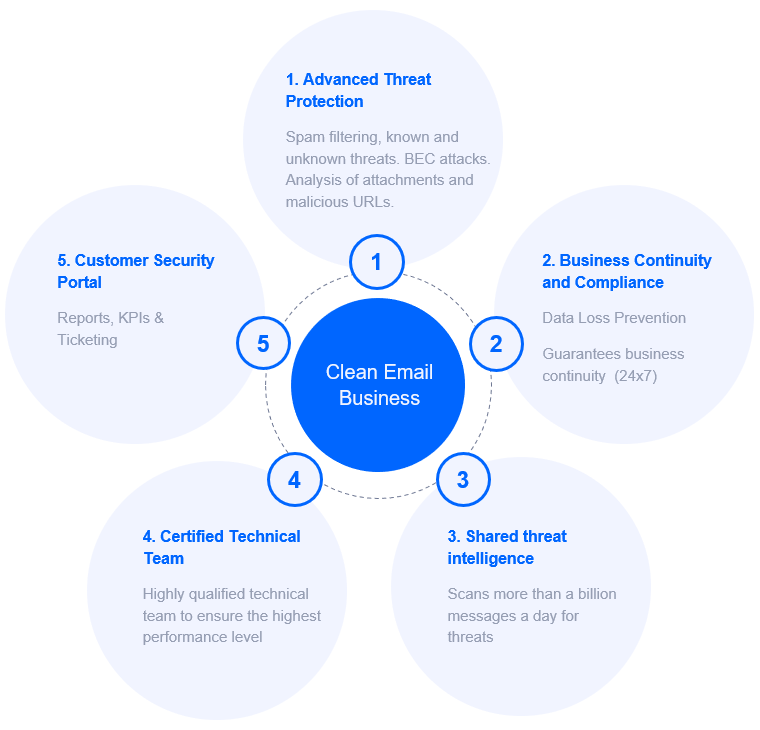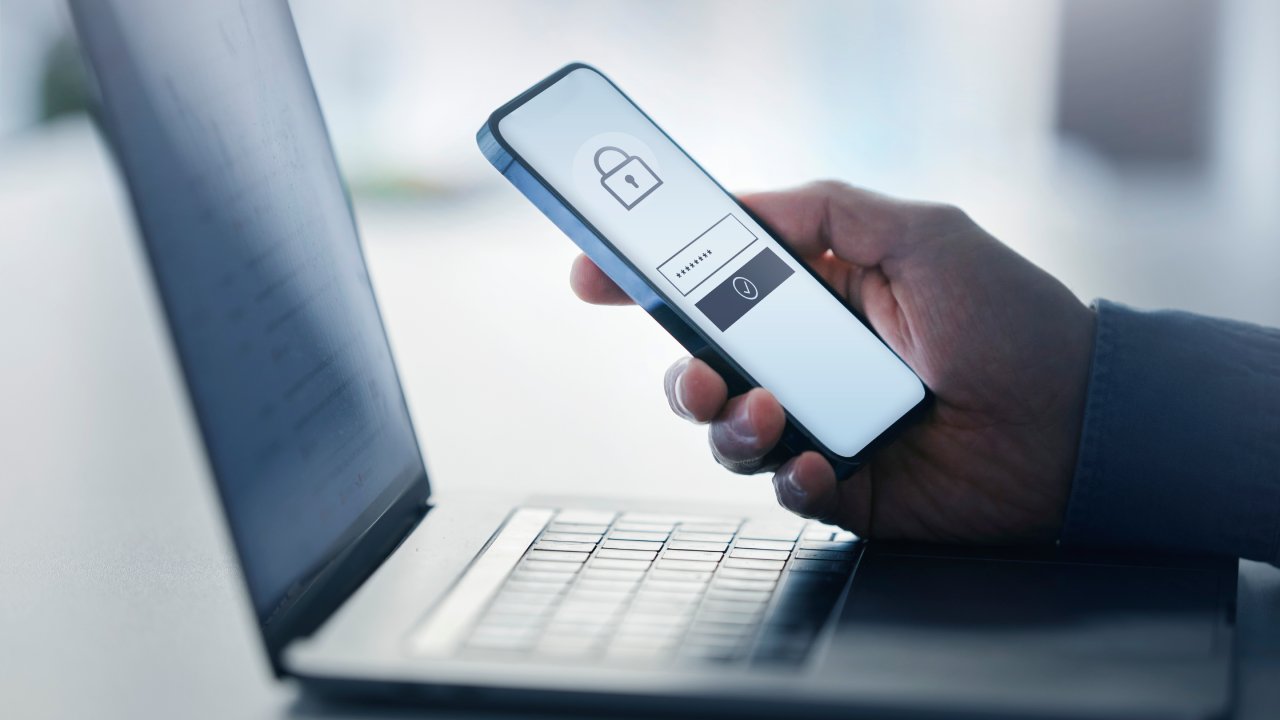How Clean Email Business protects SMEs from email cyber-attacks
Email is one of the main entry points for malicious or malicious software (malware) for SMBs to steal assets or interfere with business operations and activity. According to Verizon's Data Breach Investigations report, 43 per cent of security breaches affecting SMBs and almost all malware detected is introduced via email.
In fact, three out of four email attacks target SMEs, organisations that often lack the knowledge and budget to implement the necessary protections against ransomware, according to Covewareu.
In SMEs, email is the most commonly used communication method, so advanced email security is the only way to avoid cyber attacks via email.
According to the ESET SMB Digital Security Sentiment Report, 74% of SMEs believe that companies of their size are more vulnerable to cyber-attacks than larger companies. The causes include a lack of staff training and awareness, limited budget and investment in Cyber Security, and the challenge of keeping up with cyber threats.
This increased risk faced by SMEs makes it imperative for them to implement advanced email protection services as a measure to block the entry of malicious software (malware) and prevent email attacks.
In general, because of the lower cyber resilience of SMEs, a security incident can put their operations and financial results at risk, as well as their reputation, compliance and even business continuity.
60% of SMEs that suffer a cyber-attack disappear within six months
In order to protect SMEs from the risks associated with the use of email, Telefónica Tech offers Clean Email Business. This is an advanced managed email security service.
Clean Email Business is specifically designed to protect SMEs against both known and unknown threats. It also protects them against information leaks, ensuring business continuity and regulatory compliance.
The risks of cyber-attacks via email
Cyber-attacks via email are among the most commonly used by cybercriminals to gain access to SMEs' IT systems, including:
- Phishing, which involves sending fraudulent emails designed to look like they come from a trusted source, such as a large company or bank. Its purpose is to trick recipients into revealing sensitive information such as login credentials or financial data.
- BEC (Business Email Compromise), spear-phishing or 'CEO fraud', a variant of phishing that consists of a specific and targeted attack, against a very specific recipient, to persuade and convince them to perform actions, such as making payments or transferring money; or to reveal information, such as access credentials to the company's corporate network or bank.
Cybercriminals in a BEC attack impersonate company executives to order payments or access confidential data.
- Malware, malicious software that usually arrives as an email attachment 'disguised' as an image, PDF, Office document or as a compressed .zip file. When the recipient opens the attachment, a programme designed to steal information, hijack data for ransom (ransomware) or gain access to other computer systems on the network is executed and inserted into the computer.
SMEs' challenges in protecting themselves from cyber-attacks via email
SMEs are an attractive target for cybercriminals, as they are often more vulnerable than large enterprises. At the same time, they are also more sensitive to the economic impact of a cyber-attack, such as ransomware or phishing, so good security management poses significant challenges, including but not limited to:
- Limited resources often translate into small budgets for cyber security. SMEs need to carefully prioritise their security investments to address this challenge, focusing on cost-effective but robust solutions, such as professionally managed cyber security services that allow them to benefit from security expertise without the need for a specialised team.
- Lack of training and awareness of cyber threats and best practices in cyber security increases the risk of staff falling victim to malicious emails that put the company's security at risk. Training and awareness, as well as proven and recognised protection tools, are essential to reduce the risk of cyber-attack.
- Hiring or retaining specialised Cyber Security talent is often difficult and costly, making it difficult to build internal security teams. One solution is to outsource some or all of your cyber security needs by leveraging managed security services to access specialised expertise with less financial impact.
SMEs need comprehensive, integrated, and secure solutions to face these and other challenges, allowing them to safely navigate their digital transformation process, always accompanied and advised, in order to deal with cyber threats.
Ransomware (data hijacking) and phishing (information theft) are among the top ways attackers gain access to an organisation.
How Clean Email Business works
Clean Email Business is an advanced solution designed to protect SME email from known and zero-day threats, based on Proofpoint Essentials technology.
It is a service that constantly examines, in real time, all email entering and leaving an organisation and blocks detected threats. When it detects a malicious email, it quarantines it before it reaches the recipient's inbox, or redirects it to a sandbox to scan for malicious attachments and URLs, as well as threats based on known or unknown malware.
In this way, Clean Email Business protects SMBs against email-borne threats, including credential phishing, phishing email attacks (BEC attacks), malware and ransomware in malicious files and URLs, data leakage and spam.

In addition, Clean Email Business benefits from the capabilities of Telefónica Tech's global network of 11 Security Operations Centres (SOCs), which protects businesses and users who make use of email applications.
This assures Clean Email Business customers that they have a robust and reliable platform managed by expert Cyber Security professionals, which is adapted to their needs.
📫 Integration with Microsoft 365 email and Social Networks
Clean Email Business integrates easily and seamlessly with Microsoft 365 email, adding management tools and additional security features. In addition, Clean Email Business' emergency inbox ensures continuity of email service in the event of an outage on the customer's email server.
Clean Email Business also monitors and protects social network accounts, such as Facebook, LinkedIn, Twitter, and others, to prevent cybercriminals from posting spam and malicious content.
Overall, Clean Email Business provides SMEs with:
- Anti-spam and anti-virus protection.
- Advanced protection against malicious attachments and URLs using a dynamic sandbox.
- Protection of sensitive data leaving the company.
- Intelligent content filtering.
- Automatic email encryption.
- 24/7 emergency inbox.
- Email archiving in the cloud.
Data Leak Prevention (DLP) and email encryption built into Clean Email Business detects and protects sensitive information sent in outgoing emails.
Clean Email Business also uses machine learning techniques to perform content, context and behavioural analysis to detect and quarantine malicious emails. In addition, Proofpoint's platform analyses billions of emails every day, so Clean Email Business benefits from its global knowledge of new threats.
How to protect yourself from cyber-attacks via email
Email is the primary form of communication for SMEs. The key to preventing email cyber-attacks is to implement advanced security solutions that are affordable, easy to use and within their reach.
In addition, 74% of security breaches involve the human factor, so attackers are increasingly targeting the weakest link in a company's workforce to achieve their goal. Whether it's stolen credentials, phishing, misuse, or simply a mistake, awareness with training plays a key role in preventing cyber security incidents (Verizon DBIR 2023).
📌 Our client RTVE needed to protect their organization against cyber-attacks and illegitimate uses of the Corporation's name or image. Thanks to the Clean Email Enterprise service, our solution for big companies, RTVE has become more efficient in the detection and protection of email. Discover the success case →
This reveals the importance of cyber security training and expert support for company staff, who are increasingly exposed to cyber-attacks that use email as an entry point.
Telefónica Tech's Clean Email Business offers SMEs state-of-the-art email security, based on the advanced technology of our partner Proofpoint. We also offer small and medium-sized companies the security capabilities and specialisation of our 11 SOCs (security operations centres), where certified professionals monitor and manage the email security service to protect SMEs 24 hours a day, 365 days a year.
AUTHORS
KATTERINE NODARSE MORALES
Email Security Product Manager
DAVID MARTIN LINDSTRÖM
Global Head of Network Security
* * *
Reports:
- Verizon Data Breach Investigations Report
- ESET SMB Digital Security Sentiment Report
- Coveware: Q2Ransom Payment Amounts Decline as Ransomware becomes a National Security Priority
Photo (cc) Chuttersnap / Freepik.
 Hybrid Cloud
Hybrid Cloud Cyber Security & NaaS
Cyber Security & NaaS AI & Data
AI & Data IoT & Connectivity
IoT & Connectivity Business Applications
Business Applications Intelligent Workplace
Intelligent Workplace Consulting & Professional Services
Consulting & Professional Services Small Medium Enterprise
Small Medium Enterprise Health and Social Care
Health and Social Care Industry
Industry Retail
Retail Tourism and Leisure
Tourism and Leisure Transport & Logistics
Transport & Logistics Energy & Utilities
Energy & Utilities Banking and Finance
Banking and Finance Smart Cities
Smart Cities Public Sector
Public Sector.jpg)





